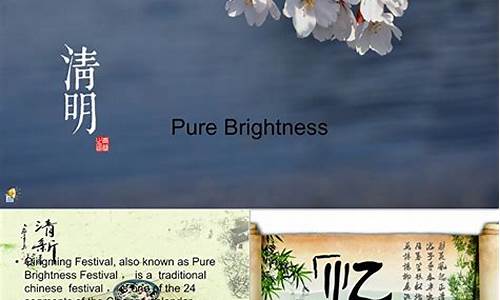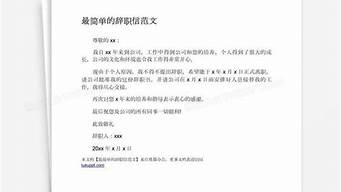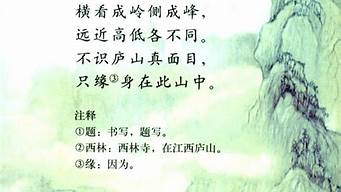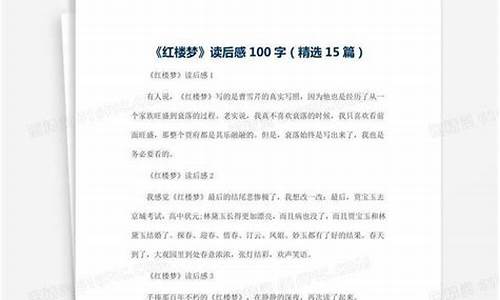清明节 英语_清明节英语怎么读
清明节 英语的今日更新是一个不断发展的过程,它反映了人们对生活品质的不断追求。今天,我将和大家探讨关于清明节 英语的今日更新,让我们一起感受它带来的高品质生活。
1.英语清明节怎么说?
2.清明节的英语
3.清明节英语怎么翻译
4.清明节英语怎么说
5.清明节用英语怎么写作文

英语清明节怎么说?
清明节来历:清明节又称绿色节日,清代节日,节日是中春和H春的交汇点。 清明既有自然和人文的内涵,也是自然和传统的节日。 清明节是一个传统的主要春节节日。 这是中华民族数千年来留下的优良传统。 它不仅有利于促进孝道,唤醒家庭记忆,而且有利于促进家庭乃至国家的凝聚力。 和一种认同感。英语:Ching Ming Festival, also known as the Green Festival, the Qing Festival, the festival is the intersection of Zhongchun and Hunchun. Qingming has both natural and humanistic connotations, which are both natural and traditional festivals.?
The Ching Ming Festival is a traditional major spring festival festival. It is a fine tradition left by the Chinese nation for thousands of years. It is not only conducive to promoting filial piety, awakening family memory, but also promoting the cohesiveness of family members and even the nation. And a sense of identity.
1、明天就是清明节了,又到了扫墓的时间。
It's Qingming Festival tomorrow, it's time to go to paying respect to the dead.?
2、每一个清明节,所有的墓地挤满了前来扫墓和献祭品的人。
On each Qingming Festival, all cemeteries are crowded with people who came to sweep tombs and offer sacrifices.?
3、冬天过去了,万物复苏,这时,一年一度的清明节又到了。
Winter have passed, and all things recovery, at this time, the annual Ching Ming Festival again.?
清明节的英语
英文是:Qingming Festival重点词汇:Festival
英['fest?vl]
释义:
n.节日;庆祝,纪念活动;欢乐
adj.节日的,喜庆的;快乐的
[复数:festivals]
短语:
Lantern Festival元宵节;农历正月十五元宵节;上元节;正月十五
扩展资料:
词语辨析:festival,day,holiday,leave,vacation
n.(名词)
这五个词都有“假日”的意思。
1、holiday来源于宗教的节日、假日,是普通用词,多用于英式英语中,指的是一个人在一年中不干工作的那段时间,也可用来表示一两天的短假期;
2、day表示法定节日,多用于专有名词中;
3、festival指民俗或宗教节日,并含有定期欢度的意味;
4、leave指政府工作人员或军人的假期;
5、vacation用于大学停课放假长达多周的假日或法院停止开庭时间,在美式英语中,凡是较长时间的休假都可用这个词。
清明节英语怎么翻译
清明节的英语:TombSweepingDay。:清明节介绍
清明节,又称踏青节、行清节、三月节、祭祖节等,清明节节期在仲春与暮春之交。清明节源自早期人类的祖先信仰,是中华民族最隆重盛大的祭祖大节。
清明节兼具自然与人文两大内涵,既是自然节气点,也是传统节日。扫墓祭祖与踏青郊游是清明节的两大礼俗主题,这两大传统礼俗在中国自古传承,至今不辍。
斗指乙(或太阳黄经达15°)为清明节气,清明节气交节时间一般在公历4月4日至6日之间变动,并不固定在某一天,但以4月5日最常见。
清明这一节气,生气旺盛,万物“吐故纳新”,大地呈现春和景明之象,正是郊外踏青春游与行清墓祭的好时节。
清明祭祖节期很长,有清明前10日后8日及清明前后各10日仲春与暮春之交两种说法,这近20天内均属清明祭祖节期内。
清明节是传统的重大春祭节日,扫墓祭祀、缅怀祖先,是中华民族自古以来的优良传统,不仅有利于弘扬孝道亲情、唤醒家族共同记忆,还可促进家族成员乃至民族的凝聚力和认同感。
清明节融汇自然节气与人文风俗为一体,是天时地利人和的合一,充分体现了中华民族先祖们追求“天、地、人”的和谐合一,讲究顺应天时地宜、遵循自然规律的思想。
清明节,是中华民族最隆重盛大的祭祖大节,属于礼敬祖先、慎终追远的一种文化传统节日。清明节凝聚着民族精神,传承了中华文明的祭祀文化,抒发人们尊祖敬宗、继志述事的道德情怀。
清明节与春节、端午节、中秋节并称为中国四大传统节日。除了中国,世界上还有一些国家和地区也过清明节,比如越南、韩国、马来西亚、新加坡等。
2006年5月20日,中华人民共和国文化部申报的清明节经国务院批准列入第一批国家级非物质文化遗产名录。
清明节英语怎么说
以下是 为大家整理的清明节英语怎么翻译,供大家参考,希望会对您有所帮助! 1、Qing Ming Jie(All Souls' Day)
Qing Ming is a time to remember the dead and the dearly departed. More important, it is a period to honour and to pay respect to one's deceased ancestors and family members. Because it reinforces the ethic of filial piety, Qing Ming is a major Chinese festival. Literally meaning "clear" (Qing) and "bright" (Ming), this Chinese festival falls in early spring, on the 106th day after the winter solstice. It is a "spring" festival, and it is an occasion for the whole family to leave the home and to sweep the graves of their forebears. Chinese being practical people this sweeping of the graves is given an extended period, that is, 10 days before and after Qing Ming day. Among some dialect groups a whole month is allocated. 清明节是一个纪念祖先的节日。主要的纪念仪式是扫墓,扫墓是慎终追远、郭亲睦邻及行孝的具体表现;基于上述意义,清明节因此成为华人的重要节日。 清明节是在仲春和暮春之交,也就是冬至后的106天。扫墓活动通常是在清明节的前十天或后十天。有些地域的人士的扫墓活动长达一个月。
ORIGIN(起源)
Qing Ming is popularly associated with Jie Zi Zhui, who lived in Shanxi province in 600 B.C. Legend has it that Jie saved his starving lord's life by serving a piece of his own leg. When the lord succeeded in becoming the ruler of a small principality, he invited his faithful follower to join him. However, Jie declined his invitation, preferring to lead a hermit's life with his mother in the mountains. Believing that he could force Jie out by burning the mountain, the lord ordered his men to set the forest on fire. To his consternation, Jie chose to remain where he was and was burnt to death. To commemorate Jie, the lord ordered all fires in every home to be put out on the anniversary of Jie's death. Thus began the "cold food feast", a day when no food could be cooked since no fire could be lit. The "cold food" festival occurs on the eve of Qing Ming and is often considered as part of the Qing Ming festival. As time passes, the Qing Ming festival replaced the "cold food" festival. Whatever practice is observed,the basic observation of Qing Ming is to remember one's elders by making a special effort to visit their graves, ashes or ancestral tablets. To make the visit even more meaningful, some time should be spent to remind the younger members of the family of the lives and contributions of their ancestors, and the story of Jie Zi Zhui who choose death over capitulation. 谈到清明节,有点历史知识的人,都会联想到历史人物介子椎。据历史记载,在两千多年以前的春秋时代,晋国公子重耳逃亡在外,生活艰苦,跟随他的介子椎不惜从自己的腿上割下一块肉让他充饥。后来,重耳回到晋国,作了国君(即晋文公,春秋五霸之一),大事封赏所有跟随他流亡在外的随从,惟独介子椎拒绝接受封赏,他带了母亲隐居绵山。 晋文公无计可施,只好放火烧山,他想,介子椎孝顺母亲,一定会带着老母出来。谁知这场大火却把介子椎母子烧死了。为了纪念介子椎,晋文公下令每年的这一天,禁止生火,家家户户只能吃生冷的食物,这就是寒食节的来源。 寒食节是在清明节的前一天,古人常把寒食节的活动延续到清明,久而久之,清明取代了寒食节。拜介子椎的习俗也变成了清明扫墓的习俗了。无论以何种形式纪念,为了使纪念祖先的仪式更有意义,我们应该让年轻一代的家庭成员了解先人过去的奋斗历史,当然,还要学习介子椎宁死不屈的气节。
2、清明节风俗 1) 扫墓 清明时节祭扫祖坟(俗称"上坟")。无锡的传统民俗较有代表性。扫墓时要挑些新士壅坟茔,而且凡新坟一定要在清明前祭扫,旧坟可以过清明.但不能过立夏。新媳妇一定要去祭扫祖坟,俗称"上花坟"。扫墓时用荤、素菜肴和酒、饭等祭奠。后用干果糕点等替代。 时至今日,在烈士陵园缅怀革命先烈成为清明节里很重要的内容,在祭炎黄二祖、悼念自己的先祖的同时,缅怀先烈的丰功伟绩,使今天的清明活动具有了更重要的教育意义。 2) 踏青 清明时节,气候温暖和煦,大地皆春,处处鲜花嫩草,一片生机盎然,人们纷纷外出踏青。在无锡,踏青的场所莫过于惠山。不上惠山的,上城墙绕城而走,叫登高踏青。东门东林庵一带,为士女聚集处,故有"东林庵里看桃花"的说法。这天,也是东乡胶山和北乡斗山的节场,附近还有赛会,故斗山别名清明山。人们都上山踏青,赶节场,观看赛会。从元宵节至清明节,大人孩子,三五成群,到野外放凤筝,别有情趣。 3) 门旁插柳和戴柳枝帽 清明节那天,有家家门口插柳条的风俗。在一些地区,还流行小孩带柳枝帽的风俗。 门旁插柳和戴柳枝帽习俗的来源也是根据介子椎的传说。据说,介子椎是死在柳树下面的。介子椎死后的第二年晋文公率领群臣到绵山致祭,一行人先在山下寒食一日,第二天才上山。那棵柳树,已经长出了翠绿的嫩条。晋文公看了,心中忽有所感,便走上前去,掐了一丝,编成一个圈儿带在头上。随从的臣下看了,也纷纷仿效他折柳插头。晋文公便把这棵柳树赐名为清明柳,把这一天定为清明节。
3、清明与节气
清明节即是节气又是节日。从节气上来说,它是24节气之一。 我国2000多年前的秦汉时期已基本形成了24节气。24节气综合了天文学和气象学等方面的知识,编排了"春雨惊春清谷天,夏满芒夏暑相连。秋处露秋寒霜降,冬雪雪冬小大寒"的歌谣。其中清明被排在歌谣的第五位。也是农历历法中的第五个节气。 此时,天气转暖,大地回春,万物复苏,一片生机盎然,家家门口插柳条,祭扫坟墓和郊外踏青。农谚中也有"清明忙种粟"的说法。作为以花信为标志的花信风。清明的花期为一侯桐花,二侯麦花,三侯柳花,充分点明了清明节气的花期和花种。《岁时百问》说"万物生长此时,皆清洁而明净,故谓之清明"。
清明节用英语怎么写作文
清明节:Tomb-SweepingDay或者QingMingFestival。作为节日和节气的清明节,它们的英文说法是不同的。
作为节日的清明节一般翻译为“TombSweepingFestival”或者“Tomb-sweepingDay”,扫墓节或扫墓日。这个翻译着重强调了清明节的重要习俗“扫墓”。这种说法的好处是,老外一听就能大概明白这个节日的背后含义。再谈到作为节气的清明,它被译为“ClearandBright”,清洁和明亮。我们也不难发现,这种译法强调的是清明时节的气候状况,和其他节气的翻译出发点一致。比如立夏被译为“Summerbegins”、小寒、大寒分别被译为“Slightcold”和“Greatcold”。清明是二十四节气之一,在仲春与暮春之交,也就是冬至后的第108天。中国汉族传统的清明节大约始于周代,距今已有二千五百多年的历史。
1. 清明节用英语怎么说阿
清 明 节(Tomb-Sweeping Day,All Souls' Day)
1、Qing Ming Jie(All Souls' Day)
Qing Ming is a time to remember the dead and the dearly departed. More important, it is a period to honour and to pay respect to one's deceased ancestors and family members. Because it reinforces the ethic of filial piety, Qing Ming is a major Chinese festival.
Literally meaning "clear" (Qing) and "bright" (Ming), this Chinese festival falls in early spring, on the 106th day after the winter solstice. It is a "spring" festival, and it is an occasion for the whole family to leave the home and to sweep the graves of their forebears. Chinese being practical people this sweeping of the graves is given an extended period, that is, 10 days before and after Qing Ming day. Among some dialect groups a whole month is allocated.
清明节是一个纪念祖先的节日。主要的纪念仪式是扫墓,扫墓是慎终追远、郭亲睦邻及行孝的具体表现;基于上述意义,清明节因此成为华人的重要节日。 清明节是在仲春和暮春之交,也就是冬至后的106天。扫墓活动通常是在清明节的前十天或后十天。有些地域的人士的扫墓活动长达一个月。
2. 清明节谚语用英语怎么写
Tomb Sweeping Day
清明节谚语
Rain before Qingming rain, frequent set
Under the rain Tomb-sweeping Day, on and off for three months
A rare sunny Qingming, Guyu rare Yin
Qingming not clear, not afraid of the rain rain
The rain before Qingming, make a good farm
Qingming rain stars, a shum to play a liter
雨打清明前,春雨定频繁
阴雨下了清明节,断断续续三个月
清明难得晴,谷雨难得阴
清明不怕晴,谷雨不怕雨
雨打清明前,洼地好种田
清明雨星星,一棵高粱打一升
3. 初一用英语写清明节的作文,60单词左右,给我看翻译,谢谢I am very angry because I was angry you die, you will not even write an English essay. I know you do not understand what I say, but I say go, I'll give you the answer is because I love you, not a general deeper. Hey. If you really need me to call me. My dear baby。
4. 写一篇清明节的英语作文Celebrated o weeks after the vernal equinox, Tomb Sweeping Day is one of the few traditional Chinese holidays that follows the solar calendar-- typically falling on April 4, 5, or 6. Its Chinese name "Qing Ming" literally means "Clear Brightness," hinting at its importance as a celebration of Spring. Similar to the spring festivals of other cultures, Tomb Sweeping Day celebrates the rebirth of nature, while marking the beginning of the planting season and other outdoor activities. Qing Ming Jiein Ancient Times An old man takes one last look before leaving the City Cemetery at Biandanshan of Wuhan, Central China's Hubei Province.In ancient times, people celebrated Qing Ming Jie with dancing, singing, picnics, and kite flying. Colored boiled eggs would be broken to symbolize the opening of life. In the capital, the Emperor would plant trees on the palace grounds to celebrate the renewing nature of spring. In the villages, young men and women would court each other. The Tomb Sweeping Day as Celebrated Today With the passing of time, this celebration of life became a day to the honor past ancestors. Following folk religion, the Chinese believed that the spirits of deceased ancestors looked after the family. Sacrifices of food and spirit money could keep them happy, and the family would prosper through good harvests and more children. Today, Chinese visit their family graves to tend to any underbrush that has grown. Weeds are pulled, and dirt swept away, and the family will set out offerings of food and spirit money. Unlike the sacrifices at a family's home altar, the offerings at the tomb usually consist of dry, bland food. One theory is that since any number of ghosts rome around a grave area, the less appealing food will be consumed by the ancestors, and not be plundered by strangers. Honoring Ancestors Honoring ancestors begins with proper positioning of a gravesite and coffin. Experts in feng shui, or geomancy, determine the quality of land by the surrounding aspects of streams, rivers, trees, hills, and so forth. An area that faces south, with groves of pine trees creates the best flow of co *** ic energy required to keep ancestors happy. Unfortunately, nowadays, with China's burgeoning population, public cemetaries have quickly surplanted private gravesites. Family elders will visit the gravesite at least once a year to tend to the tombs. While bland food is placed by the tombs on Qing Ming Jie, the Chinese regularly provide scrumptious offerings to their ancestors at altar tables in their homes. The food usually consists of chicken, eggs, or other dishes a deceased ancestor was fond of. Acpanied by rice, the dishes and eating utensils are carefully arranged so as to bring good luck. Sometimes, a family will put burning incense with the offering so as to expedite the transfer of nutritious elements to the ancestors. In some parts of China, the food is then eaten by the entire family. Kites Besides the traditions of honoring the dead, people also often fly kits on Tomb Sweeping Day. Kites can e in all kinds of shapes, sizes, and colors. Designs could include frogs, dragonflies, butterflies, crabs, bats, and storks.。
5. 怎样度过清明节的英语作文First of all, I get up at six in the morning, that was a long time! Wash gargle after the start up working;
Secondly, a few hours later, at around ten o 'clock, I and a friend to climb the mountain this three days,
We climbed o place mountain, hills and canyons park positives. This is also I will benefit most. Although clarity is
To grave, honoring the holiday, but we loved borrowed this holiday, let us enjoy the scenery, spread
Heart, it is rewarding.
6. 清明节快乐英语怎么说清明节快乐:Happy Tomb Sweeping Day.
例句:Qing Ming Festival, also called Tomb-Sweeping Day or Pure Brightness Day. It's a bination ofsadness and happiness.
清明节,又称为清明节、清明节。这是一个组合的悲伤和快乐。
清明节的这一天,我们要去祭拜自己的祖先,有关这方面的英语词汇和短语了。如:
1、祭拜:worship
2、祖先:ancestor
3、坟:grave/tomb[巧记:鲁迅写了一部作品叫《坟》(grave/tomb)]
4、扫墓:sweep the tomb[sweep:打扫;tomb/tu:m/:坟墓(从它的音标知道后面的“b”是不需要发音的);
5、扫墓时要烧香(burn joss sticks/thurification/Θjurifikein)、烧纸(burn paper money)、燃放鞭炮(set off firecrackers)
好了,今天关于清明节 英语就到这里了。希望大家对清明节 英语有更深入的了解,同时也希望这个话题清明节 英语的解答可以帮助到大家。
声明:本站所有文章资源内容,如无特殊说明或标注,均为采集网络资源。如若本站内容侵犯了原著者的合法权益,可联系本站删除。












